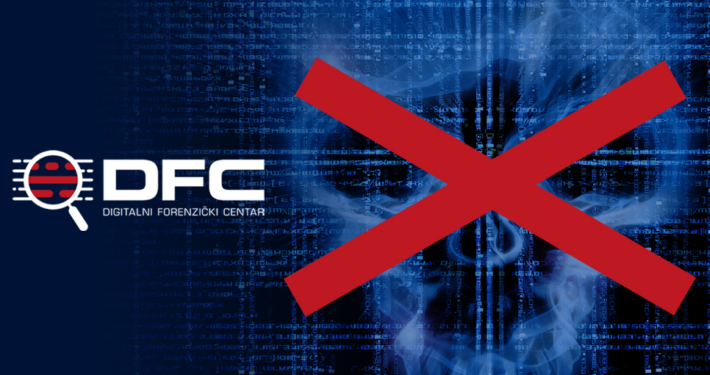Disinformation and false news have become a constant in our lives, and the development of media and digital literacy will be the key in the fight against these phenomena and further democratization of society, the Digital Forensic Center estimates.
At the annual DFC conference, the President of the Atlantic Alliance Savo Kentera assessed that everything that Moscow has done since Montenegro joined NATO, in cooperation with local actors – political, media, NGOs, was aimed at strengthening divisions among citizens and spreading Russian influence in Montenegro through the promotion of Moscow as a protector of Serbs and Orthodoxy.
Kentera said that Moscow continues to weaken the pillars of Montenegrin statehood and identity, but also continues to discredit NATO and the West by using propaganda, historical revisionism and the daily placement of misinformation.
According to him, Serbia, as a key Russian partner in the Balkans, enables the spread of Russian influence throughout the region.
“In the political and security synergy of the two countries, a construct of the so-called Serbian world has been created, which represents nothing but the well-known concept of the Russian world,” Kentera said, adding that if we want to eliminate Russia's and Serbia's malignant influence in the Western Balkans, it is necessary to cooperate more than ever with Western friends and allies.
Kentera pointed out that Moscow continues to weaken the pillars of Montenegrin statehood and identity, but also continues to discredit NATO and the West by using propaganda, historical revisionism and the daily placement of misinformation.
The team of the Digital Forensic Center, as they remind, analyzed over 50,000 articles in national and regional media in the last 12 months, of which 35% contained some kind of manipulation of information, and most of them were in the media from Serbia.
DFC paid special attention to the most widely read Serbian media in Montenegro and in that analysis of a one-year research on Serbian media gave a detailed insight into reporting on Montenegro.
“15,825 articles with the keyword Montenegro were included and an insight into the narratives and the number of articles published by the most widely read Serbian media in Montenegro was given. Out of 15,825 articles, 9,698 directly targeted Montenegro, and out of that number, the DFC singled out 4,265 relevant articles,” the DFC states.
They emphasize that this quantitative and qualitative analysis reveals that the writing of these media is full of sensationalism, misinformation and the absence of journalistic ethics.
LIST OF STATISTICS OR POLICIES?
The DFC points out that nation, religion and language are three particularly sensitive and deeply politicized issues, a constant of social polarization.
“These words could summarize the political and overall social reality in the context of the upcoming census in Montenegro. Insisting on particularity at the expense of inclusiveness and universality of the concept of civil society has conditioned the ideologizing of social consciousness in which the politics of identity based on the dichotomy of me and them dominates”, they assess in the DFC.
They point out that in such a shaped social environment, it should not be surprising to reduce or, better said, subordinate a dominant (but not exclusively) statistical category (such as the census) to politics and the ethnophiletistic matrix of blood cell counts, which, ultimately, may result in a slowdown in the development processes of the democratic system.
The Directorate for Statistics (MONSTAT), as they remind, prepared in March the Draft Law on the Census for 2021, which was harmonized with the EC Regulation and envisaged the collection of data according to the European list.
“The Ministry of Finance and Social Welfare then, before consultations with the interested public, made changes, ie expanded the European list with certain data, and the session of the Government at which the Draft Law on Census was to be determined was announced for August 26. However, due to organizational and personnel difficulties in the implementation of the Law, it is still pending its adoption at the Government session and entry into the parliamentary procedure”, remind from the DFC.
The Democratic Front, as they point out, using significant blackmail potential, opened the space for further political manipulation of the census issue.
The analysis states that, unlike the traditional door-to-door census model, most countries that share the European value framework conduct a population census without collecting data on nationality, religion or language.
SOCIAL INSTABILITY
The DFC estimates that the political perception of the census and the appearance of the dominant part of the ruling political elite from a position that aspires to form a nation state has the potential to generate tectonic disturbances in the three-member ruling coalition, but also causes wider social instability.
“The DF insists on holding the census until the end of this year, under the threat of overthrowing the government, which sees the census as an opportunity for final confirmation of the results of last year's parliamentary elections and, in the long run, a precondition for realizing the idea of unification into the Serbian world”, cited, among other things, the DFC.
They point out that postponing the census would mean moving from the questionnaire to registering records (which means excluding the issue of national declaration), and not before 2025, since 2022 local elections are planned for 2022 in 12 Montenegrin municipalities, then the presidential elections a year later, and the regular parliamentary elections in 2024.
“International standards in this regard are clear that the census time should not coincide with the election years,” the DFC said, adding that, in addition, the census results were important for the DF and from the point of view of editing the voter list (although these are completely different databases), ie national engineering by deleting part of the Bosniak and Albanian diaspora, but not the double voters who simultaneously exercise the right to vote in Montenegro, Serbia and Bosnia and Herzegovina.
